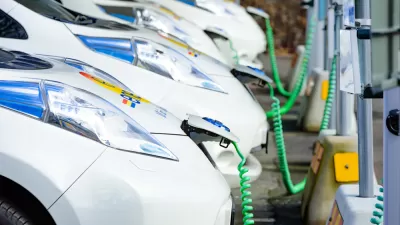$7 gas is necessary according to a new report if transportation emissions are to be reduced to EPA targets by 2020. What's more, providing tax credits for electric and hybrid vehicles would backfire. The report recommends steep gas tax increases.
To meet the EPA's 2020 targets for cutting greenhouse gas emissions by 14%, the cost of gas would have to increase to $7 a gallon, according to a March report by researchers at Harvard's Belfer Center for Science and International Affairs.
"Most of their models assumed an economy-wide carbon dioxide tax starting at $30 a ton in 2010 and escalating to $60 a ton in 2030. In some cases researchers also factored in tax credits for electric and hybrid vehicles, taxes on fuel or both.
In the modeling, it turned out that issuing tax credits could backfire, while taxes on fuel proved beneficial."
'Tax credits don't address how much people use their cars,' said Ross Morrow, one of the report's authors. 'In reverse, they can make people drive more.'
"Researchers said that vehicle miles traveled will increase by more than 30 percent between 2010 and 2030 unless policymakers increase fuel taxes."
Thanks to Ron McLinden
FULL STORY: Fuel Taxes Must Rise, Harvard Researchers Say

Americans May Be Stuck — But Why?
Americans are moving a lot less than they once did, and that is a problem. While Yoni Applebaum, in his highly-publicized article Stuck, gets the reasons badly wrong, it's still important to ask: why are we moving so much less than before?

Using Old Oil and Gas Wells for Green Energy Storage
Penn State researchers have found that repurposing abandoned oil and gas wells for geothermal-assisted compressed-air energy storage can boost efficiency, reduce environmental risks, and support clean energy and job transitions.

Placekeeping: Setting a New Precedent for City Planners
How a preservation-based approach to redevelopment and urban design can prevent displacement and honor legacy communities.

San Francisco’s Muni Ridership Grew in 2024
The system saw its highest ridership since before the Covid-19 pandemic, but faces a severe budget shortage in the coming year.

Colorado Lawmakers Move to Protect BRT Funding
In the face of potential federal funding cuts, CDOT leaders reasserted their commitment to planned bus rapid transit projects.

Safe Streets Funding in Jeopardy
The Trump administration is specifically targeting bike infrastructure and other road safety projects in its funding cuts.
Urban Design for Planners 1: Software Tools
This six-course series explores essential urban design concepts using open source software and equips planners with the tools they need to participate fully in the urban design process.
Planning for Universal Design
Learn the tools for implementing Universal Design in planning regulations.
Heyer Gruel & Associates PA
City of Moreno Valley
Institute for Housing and Urban Development Studies (IHS)
City of Grandview
Harvard GSD Executive Education
Salt Lake City
NYU Wagner Graduate School of Public Service
City of Cambridge, Maryland





























